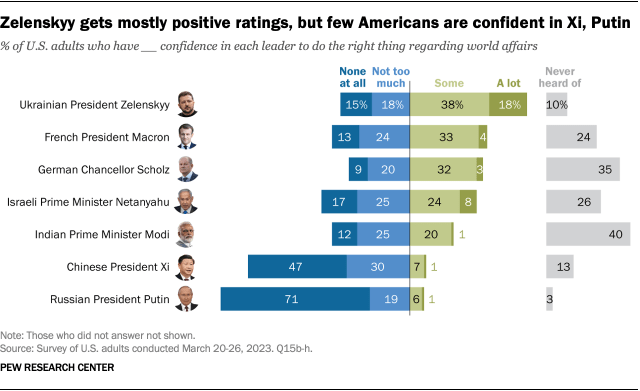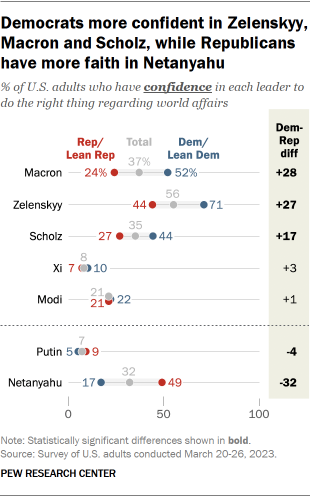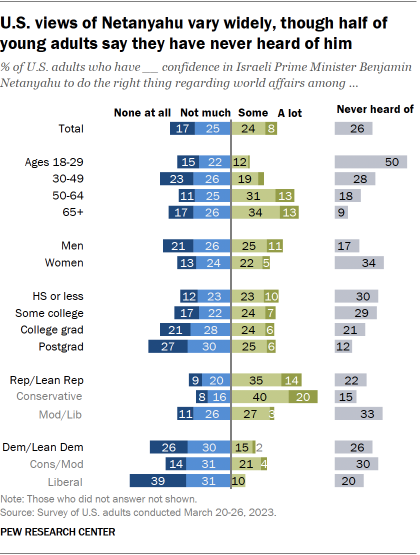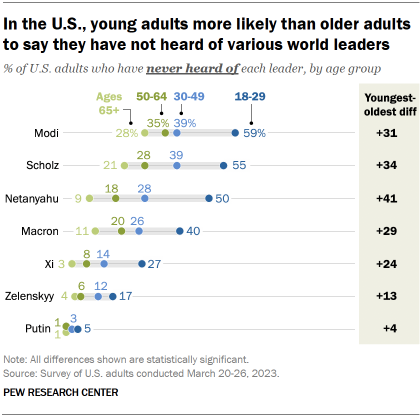Americans express more confidence in Ukrainian President Volodymyr Zelenskyy than in any of the other six world leaders included in a new Pew Research Center survey. More than half of U.S. adults (56%) have at least some confidence in Zelenskyy to do the right thing regarding world affairs. By comparison, fewer than one-in-ten have confidence in Chinese President Xi Jinping (8%) or Russian President Vladimir Putin (7%).

The survey, conducted March 20-26, finds that sizable shares of the U.S. public have not heard of several world leaders. For example, 40% of U.S. adults say they have not heard of Indian Prime Minister Narendra Modi; 35% have not heard of German Chancellor Olaf Scholz; and around a quarter have not heard of Israeli Prime Minister Benjamin Netanyahu (26%) or French President Emmanuel Macron (24%). The survey marks the first time that Pew Research Center has included a “never heard of” response option, which means the results are not directly comparable to past surveys that did not include this option.
Pew Research Center conducted this study to examine Americans’ attitudes toward various world leaders. For this analysis, we surveyed 3,576 U.S. adults from March 20-26, 2023. Everyone who took part in this survey is a member of Pew Research Center’s American Trends Panel (ATP), an online survey panel that is recruited through national, random sampling of residential addresses. This way, nearly all U.S. adults have a chance of selection. The survey is weighted to be representative of the U.S. adult population by gender, race, ethnicity, partisan affiliation, education and other categories. Read more about the ATP’s methodology.
The Center has measured confidence in world leaders for decades. However, this year we added a “never heard of” response option in the U.S. to more closely align our survey results with phone and face to face survey data from other countries, where more respondents offer “don’t know” or “refused” than web-based respondents as responses. As a result, confidence trends from our previous surveys on world leaders are not directly comparable to this year’s data.
Here are the questions used for the report, along with responses, and the survey methodology.
Amid the war in Ukraine, Americans have mostly positive views of Zelenskyy (also spelled Zelensky) and intensely negative views of Putin: 71% say they have no confidence at all in the Russian president, the largest share to say this about any leader in the survey. An additional 19% do not have much confidence in the Russian leader. Previous Center research has also found strongly unfavorable opinions of Putin among Americans.
Americans also broadly lack confidence in Xi. About eight-in-ten (77%) do not have confidence in the Chinese leader, including 47% who have no confidence at all. (For more on U.S. views of Xi, see “Americans Are Critical of China’s Global Role – as Well as Its Relationship With Russia.”)
The public is split on France’s president: 37% have confidence in Macron to do the right thing regarding world affairs, while the same size share do not have confidence. Widespread protests across France, sparked by Macron’s proposal to increase the retirement age by two years, took place during survey field period.
Scholz, Germany’s chancellor since 2021, receives similar confidence ratings to Macron, with 35% expressing confidence and 29% expressing no confidence. While more than a third of Americans (35%) are not familiar with Scholz, Americans feel positively about the state of relations between the United States and Germany since he took office.
Americans see Netanyahu, Israel’s prime minister, more negatively than positively: 42% have no confidence in him, while 32% have confidence. The survey was fielded amid protests in Israel related to Netanyahu’s proposed changes to the nation’s judicial system.
A plurality of Americans say they have never heard of India’s prime minister. But among those who do express an opinion of Modi, 37% have little or no confidence in his ability to do the right thing regarding world affairs, compared with 21% who are confident.
Partisan divisions in Americans’ views of world leaders
There are several significant partisan differences when it comes to how Americans view world leaders. Democrats and Democratic-leaning independents are more likely than Republicans and Republican leaners to have confidence in Zelenskyy, Macron and Scholz. Republicans, in turn, are more likely than Democrats to have confidence in Netanyahu and Putin. This aligns with past Center research showing Democratic confidence in European leaders, as well as more Republican support than Democratic support for Israel’s prime minister.

Overall, 71% of Democrats have confidence in Zelenskyy, compared with 44% of Republicans. Democrats and Republicans have also recently diverged in their views of U.S. support for Ukraine.
Democrats are about twice as likely as Republicans (52% vs. 24%) to have confidence in Macron to do the right thing regarding world affairs. Similar partisan differences appear for Germany’s Scholz (44% vs. 27%), as they have in past Center research.
On the other hand, Republicans are 32 percentage points more likely than Democrats to have confidence in Netanyahu (49% vs. 17%). The difference is even greater when looking at ideology alongside party. Six-in-ten conservative Republicans have confidence in the Israeli prime minister, compared with three-in-ten moderate and liberal Republicans. Among Democrats, around a quarter of conservatives and moderates (24%) have a positive view of Netanyahu, compared with only one-in-ten liberal Democrats.
In addition, younger Republicans – those ages 18 to 49 – are less positive about Netanyahu than their older counterparts. But this is largely because 35% of younger Republicans say they have never heard of the Israeli leader. Still, only three-in-ten Republicans in this age group have confidence in Netanyahu, far less than the 66% among Republicans ages 50 and older

White evangelical Christians in the U.S. are particularly likely to have confidence in Netanyahu, with 53% falling into this category. By contrast, just 17% of religiously unaffiliated Americans have confidence in him, although 32% have never heard of him. (There were not enough Jewish Americans in the sample to report results separately. For more on Jewish American views toward Netanyahu and Israel from 2019-2020, see “Jewish Americans in 2020.”)
Among Republicans and Democrats alike, pluralities say they have not heard of Modi, India’s leader. When it comes to the presidents of Russia and China, very few Republicans and Democrats express confidence: No more than one-in-ten adults in either party have confidence in Putin or Xi.
Age differences in Americans’ familiarity with world leaders
Americans’ awareness of foreign leaders varies greatly by age. Adults under 30 are much less likely than those ages 65 and older to be familiar with every leader included in the Center’s new survey – with the exception of Putin, who is known to the vast majority of the public.

For example, nearly six-in-ten Americans ages 18 to 29 say they have never heard of Modi, compared with 28% of those 65 and older. Large age differences also appear for Scholz, Netanyahu and Macron.
There are also consistent gaps in awareness by other demographic factors. Men, for instance, are more likely than women to offer an opinion on various world leaders and less likely to say they have never heard of them. The same is true of more educated Americans relative to those with less formal education. This tracks with past Center research on specific international knowledge among Americans.
Note: Here are the questions used for the report, along with responses, and the survey methodology.




